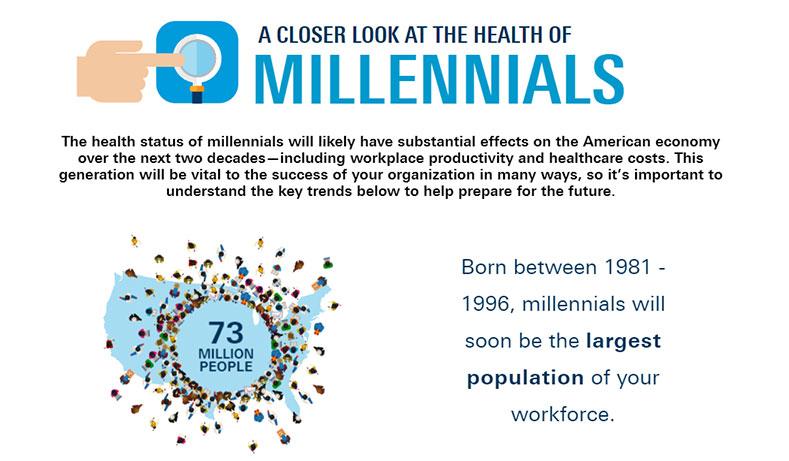Millennials will change workplace health
Engaging and empowering a generation at work
Millennials — they’re a generation that’s getting a lot of attention these days, and it’s easy to see why. According to the U.S. Bureau of Labor Statistics, millennials (those born between about 1981 and 1996) will soon be the largest segment in the workplace, expected to grow to 50% of the workforce within the next two years — and by 2030 that number will increase to 75% of the U.S. workforce.
In a recent Blue Cross Blue Shield, The Health of America Report®, The Health of Millennials, we uncovered a few concerning trends that could directly impact the future health of your organization. For instance, did you know that one-third of millennials have health conditions that affect their quality of life, with behavioral health being a major contributing factor? In fact, major depression as well as hyperactivity and type II diabetes had the largest growth in prevalence among millennials from 2014-2017. And does it surprise you to learn that millennials are less healthy than Gen Xers were at the same age?
Now’s the time to address millennial health
As more and more employers are finding out, millennials have different expectations than previous generations when it comes to the workplace and benefits. We heard that creating a culture that meets their goals and objectives through flexible work schedules and work/life balance is important. In terms of benefits, some said employers who offer good health benefits and wellness programs are viewed as being invested in and caring for their employees.
According to the National Millennial Health survey conducted by the Blue Cross Blue Shield Association in August 2019, 42% of millennials said that their employer’s health insurance was a positive factor in their choice to work for them. What’s more, the majority of those surveyed (52%) said their current health insurance is very or extremely impactful on their decision to stay with their current employer.
Offering great benefits is one thing; making sure your employees take full advantage of their benefits is another. Participants we talked to agreed that even though they are highly educated, they still struggle with understanding how to use their health insurance and access services. Whether it be through better communication and education, or well-being incentives and perks, employers need to find more effective ways to connect and engage with their millennial employees.
So, exactly how does your organization meet millennials where they are in terms of healthcare? Good question — and one we asked our participants. Based on their responses, here are some suggestions worth considering:
- Millennials want their company’s human resources and onboarding teams to serve a more prominent role in connecting them to healthcare providers as well as other health and non-health related resources.
- If communicating something important, including information about health, the message could be more effective if delivered personally rather than through a mass announcement.
- Millennials put an emphasis on non-health related benefits such as loan/tuition reimbursement, financial planning and onsite wellness classes like meditation — offering these types of benefits may help reduce stress and anxiety, promote physical activity and healthier eating habits.
- Millennials are interested in alternative treatments or natural health options (i.e., chiropractic care, acupuncture, dietary plans) as part of their benefits packages. They’re more apt to want to use these health options and services as opposed to going to see a doctor, which is usually a last resort, because it’s often inconvenient and expensive.
- Millennials are seeking a multi-dimensional care model that provides a balance between both in-person visits and digital care (i.e., online scheduling, digital communication with providers, telehealth).
Personalizing and optimizing healthcare
The more we start thinking about personalizing and optimizing healthcare to help it work harder for millennials, the closer we may get to improving the health of this generation—and strengthening the future health of your organization.
